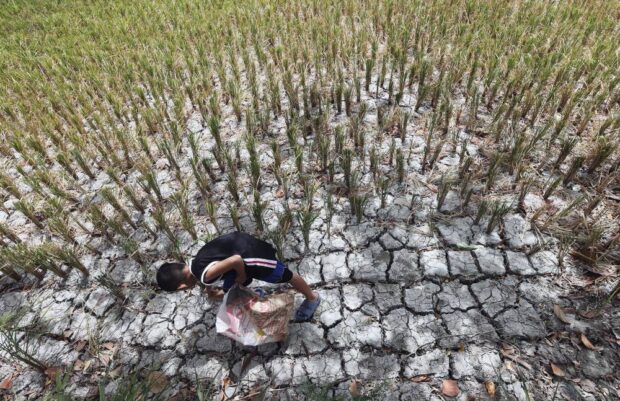Inflation uptick seen with strong El Niño, says BSP official

PARCHED | In this photo taken in May 2023, a boy walks through a parched rice field in Tanza, Cavite, as the state weather bureau issued an El Niño alert. (File photo by MARIANNE BERMUDEZ / Philippine Daily Inquirer)
MANILA, Philippines — The likelihood that the ongoing El Niño weather phenomenon will become a “historically strong” event in the next two months has increased, with the probability raised to 54 percent from just 35 percent as assessed just a month ago, according to the US Climate Prediction Center (US CPC).
If this comes to pass, the current El Niño will potentially be among the five worst El Niño events since 1950, the scientific agency said.
One of these is the El Niño occurrence in 2015-2016, which the World Bank said inflicted $325 million or about P18 billion in damage and production losses to the Philippine agriculture sector.
El Niño brings lower than normal rainfall or even drought to areas in the Philippines, threatening major crops like rice and corn production. The reduced output will, in turn, lead to higher prices.
The phenomenon occurs on average every two to seven years and can last nine to 12 months, according to the Geneva-based World Meteorological Organization.
Article continues after this advertisementState meteorologists officially declared the onset of this latest El Niño event on July 4 this year and it would likely persist until January 2024.
Article continues after this advertisementWary
The Bangko Sentral ng Pilipinas (BSP) is particularly wary of the impact of El Niño as this will mean an uptick in inflation just when the rate of increase in the prices of basic goods and services has been inching closer to the government’s target range of 2 to 4 percent.
This is important for the BSP, one of whose main tasks is to shepherd inflation within what the central bank considers an acceptable range of price growth. The BSP does this mainly by tweaking interest rates on money borrowed from banks.
BSP Senior Assistant Governor Iluminada Sicat said at a press briefing that a strong El Niño was expected to add 0.02 percentage point to monthly inflation readouts.
“Inflation could temporarily accelerate above the target [range in the second quarter] due to the impact of El Niño weather conditions and also due to the lagged impact of wage adjustments in 2023,” Sicat said.
Inflation was pegged at 4.1 percent in November, down from a peak of 8.7 percent recorded last January.
El Niño, according to a US CPC bulletin, is expected to continue through the northern hemisphere winter, but with a 60-percent chance of dissipating into a “neutral” scenario — when there is neither El Niño nor its twin and opposite, La Niña — as early as April.
“Based on the latest forecasts, there is now a 54-percent chance of a ‘historically strong’ El Niño during the November-January season,” the CPC said.
Securing food supply
According to Finance Secretary Benjamin Diokno, intensified efforts to increase agricultural productivity will be supplemented by measures to improve the importation of needed goods.
This is to help secure food supply amid global threats of El Niño and other natural calamities, trade protectionism by other countries, and geopolitical tensions.
Related to this, President Ferdinand Marcos Jr. has approved another yearlong extension — up to Dec. 31, 2024 — of Executive Order (EO) No. 10, which temporarily reduces import duties on key commodities, including rice, corn, and pork.
The extension of EO 10 was based on the recommendation of the National Economic and Development Authority board, which Economic Planning Secretary Arsenio Balisacan said would help ensure an adequate supply of agricultural commodities and maintain stable and affordable prices, thereby better managing potential inflationary pressures.
Last week, Balisacan said that the government could not, and would not, be complacent, as the Philippines continued to have the highest inflation rate among Southeast Asian peers.
“This is amid our many risks, including the El Niño phenomenon and the simmering geopolitical tensions that may increase uncertainty and disrupt supply chains,” Balisacan said.